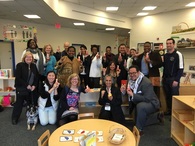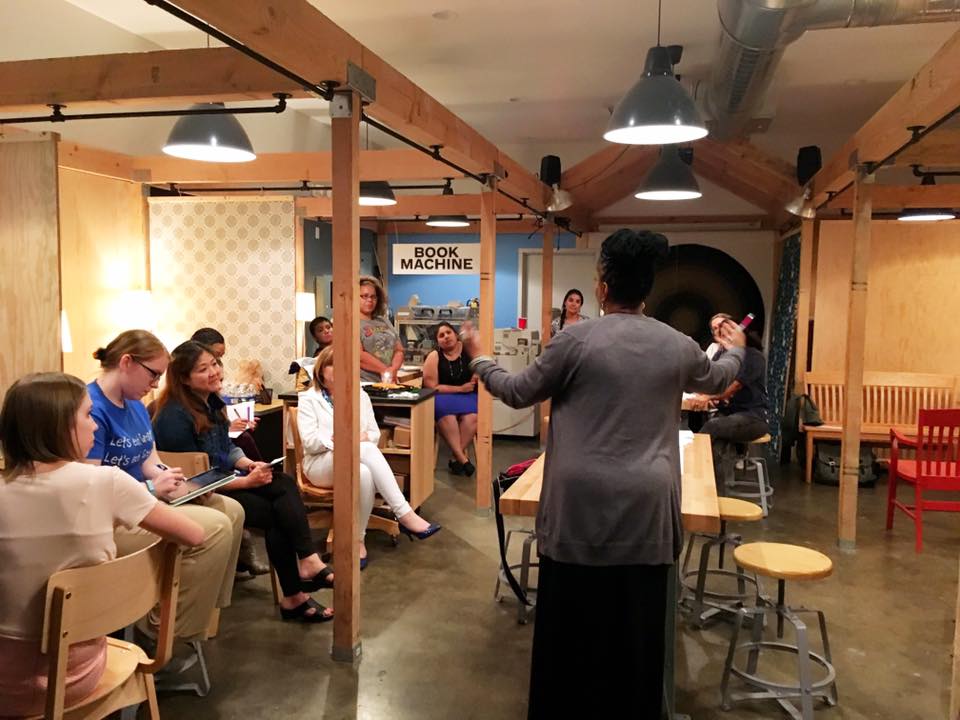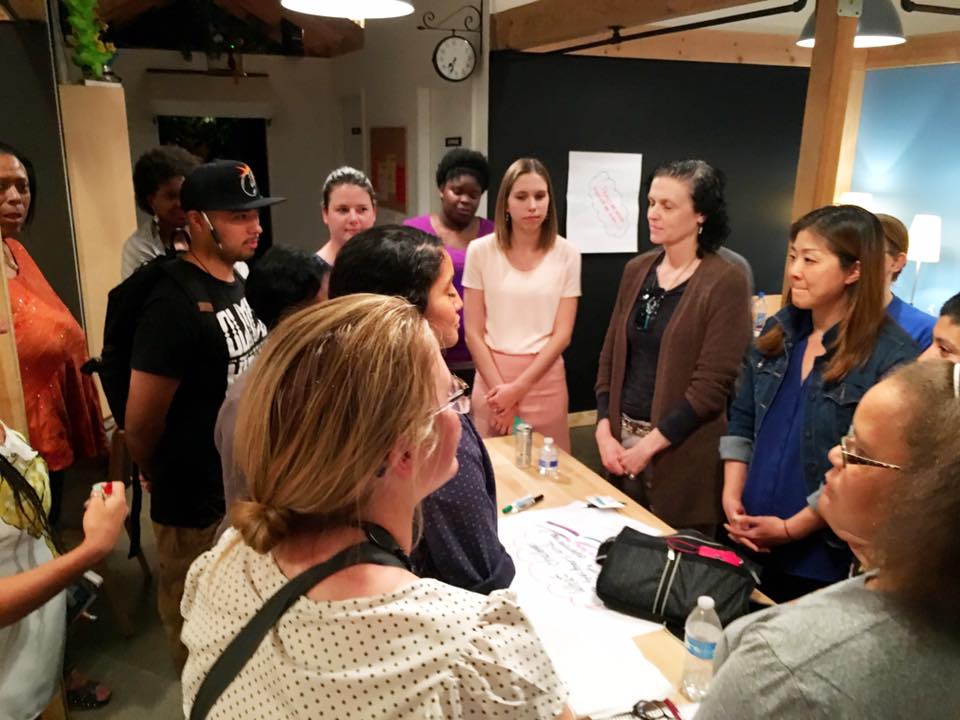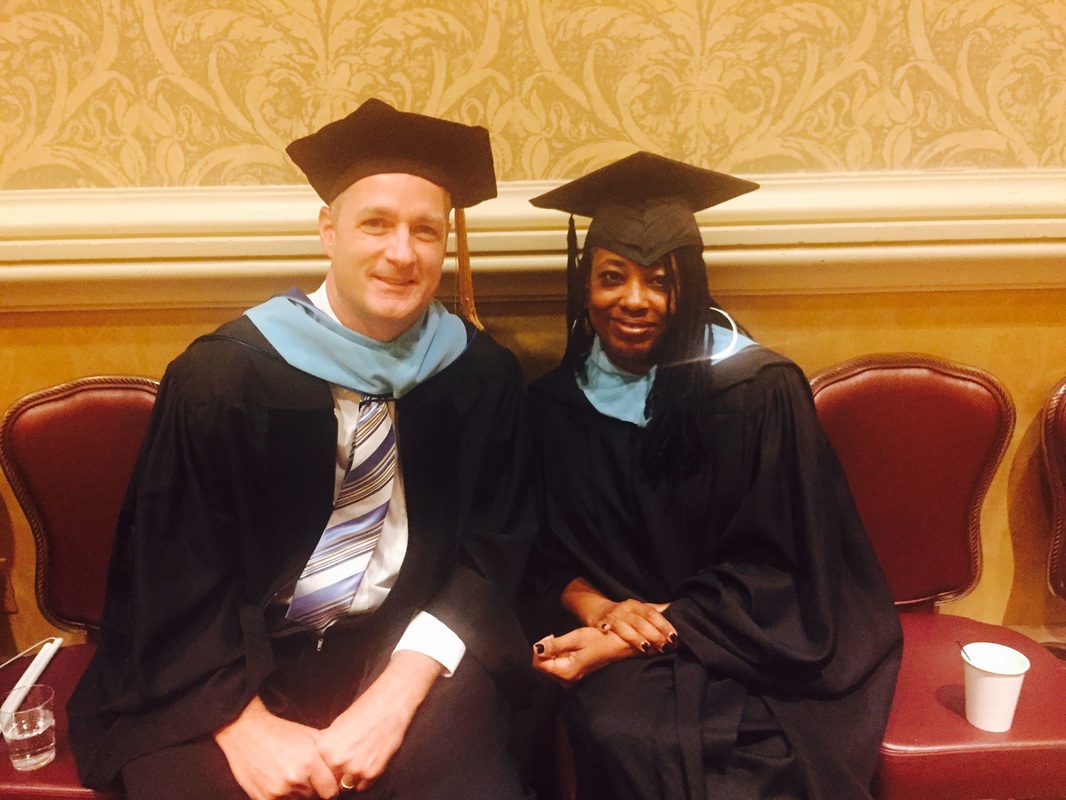Teaching Philosophy
I am an anti-racist scholar activist committed to equity in education. My teaching philosophy is rooted in a definition of social justice centered in the belief that education and the schooling process should provide “full and equal access, opportunity, and participation of all individuals and groups in a society, and its institutions, resulting in an inclusive vision of relationships between them that are mutually shaped to meet everyone’s needs, so that equitable and fair distributions of wealth, power, and equal outcomes are realized, and markers of socio-historic privilege, domination, marginalization, subordination, and oppression are eliminated.” (Adams, Bell, and Griffin, 2007).
It is with this objective in mind, that I employ an anti-racist and culturally relevant praxis (Ladson-Billings, 1995; Gay, 2000): (a) critical inquiry indicative of questions rooted in the authentic experiences of my adult students’ and their student’s lived experiences; (b) inter-group dialogue which requires meaningful examination of multi-ethnic, multi-racial, and multi-cultural perspectives, (c) problem-posing and case-analysis situated in the real-time, real-life equity challenges faced by schools, communities, and society-at-large; (d) modeling evidence-based teaching behaviors, including modeling relationship building, empathy, trust, culturally relevant instructional methodologies, differentiation, and the use of meaningful assessments; and (e) Paulo Freire's (1970) reflexive praxis, including operationalizing an instructional process that incorporates critical dialogue, reflection, and teacher action. I understand that all of my students, regardless of background, bring a wealth of valuable knowledge, experiences, and cultural capital (Moll, Amanti, Neff, and Gonzalez, 1992 and Yosso, 2005) to the learning space, and it is my role as an educator to draw on these assets to engage them in meaningful ways and enhance learning.
I also understand that like my students, I bring my own experiences and subjectivities to the classroom. As Pine (2011) reminds, "When we enter the classroom, we bring who we are as people - our gender, race, ethnicity, worldview, beliefs, ideologies, assumptions, values, perceptions, past experiences, personal history, biases, and attitudes. We cannot escape who we are, nor can we keep who we are out of the classroom" (p.201). It is my responsibility to keep this in mind, and to ensure that we, my students and I, are constantly unpacking our experiences as a way to understand how they shape our standpoints and pedagogy, and thus the relationships we build and engage with others, especially historically marginalized and minoritized students, families, and communities. I use these experiences to help students understand the most recent trends in education and pedagogy and how these things are both framed and impacted by their own developing educator practice. This also means understanding and unpacking the socio-historical context within which their experiences sit, so as to develop a teaching and leadership identity aligned with an equity orientation. Weaving critical multicultural content and pedagogy within the courses I teach as I attempt to do this work is critical. I am also committed to modeling culturally responsive pedagogy when differentiating and scaffolding lessons so that my students are provided with opportunities to practice doing the same. Ultimately, I see myself as a facilitator and co-constructor of knowledge, understanding that no mind is empty; we all come with knowledge to share and my role is to provide the space to do so.
My teaching pedagogy also incorporates structuring teaching and learning spaces that foster goal setting, critical thinking and metacognitive introspection. Each of these strategies are essential, particularly when supporting students as they grow and develop toward learning goals. I also set my own instructional goals for students, including providing them with (a) opportunities to develop an awareness of self, personal beliefs, values and life experiences in relationship to leadership practice and engagement with others; (b) a well-grounded understanding of leadership philosophy and theory, particularly as related to culturally relevant pedagogy and social justice; (c) professional development experiences that emphasize a critical race and social justice orientation; (d) the ability to refine, reframe, and/or reconstruct personal leadership pedagogy in ways that lead to advocacy and activism for all students; and (e) a forum within which to apply a critical lens to more effectively understand and address educational issues through scholarship and practice, including being prepared to promote racial, cultural, and social equity in educational settings as emerging teachers and leaders of PK-16+ schools and/or district/administrative offices.
Finally, I understand that learning takes time (Ambrose, Bridges, DiPietro, Lovett, & Norman, 2010). I make every attempt to provide my students with opportunities to fully develop the dispositions, knowledge, and skills necessary to be successful in reaching goals and mastering content. I do so by developing engaging activities, field experiences, research opportunities, and authentic assessments aligned with learning goals and objectives. I also provide critical and corrective feedback designed to help them grow. For example developing field study experiences aligned with core courses as a way to provide students with authentic application of content is one way I do this work. I also engage students in interactive reflective journals to provide them with an opportunity to explore learning as a result of these experiences and provide timely feedback and resources to help promote development and growth. Providing assessments and rubrics, and allowing for revisions and resubmissions, also enables my students to learn important skills and master essential material.
Teaching is a complex task that requires knowledge of students, an understanding of how people learn, critical consciousness, multicultural knowledge, and professional decision making. Yet, there is no more exciting, nor challenging endeavor than to teach. I am constantly reminded of how my lived experiences shape my teaching, my teaching shapes my research, and my research informs both (Bain, 2004), and I love this interplay between each. I make every effort to approach each new semester, course, and teaching and learning space as a new opportunity to learn, grow, develop, and move closer to equity and racial justice, in collaboration and partnership with my students, and am keenly aware that this side-by-side work has the potential to have impact on thousands more in PK-16+ education. As a result, I feel honored and privileged to serve as I engage this work.
It is with this objective in mind, that I employ an anti-racist and culturally relevant praxis (Ladson-Billings, 1995; Gay, 2000): (a) critical inquiry indicative of questions rooted in the authentic experiences of my adult students’ and their student’s lived experiences; (b) inter-group dialogue which requires meaningful examination of multi-ethnic, multi-racial, and multi-cultural perspectives, (c) problem-posing and case-analysis situated in the real-time, real-life equity challenges faced by schools, communities, and society-at-large; (d) modeling evidence-based teaching behaviors, including modeling relationship building, empathy, trust, culturally relevant instructional methodologies, differentiation, and the use of meaningful assessments; and (e) Paulo Freire's (1970) reflexive praxis, including operationalizing an instructional process that incorporates critical dialogue, reflection, and teacher action. I understand that all of my students, regardless of background, bring a wealth of valuable knowledge, experiences, and cultural capital (Moll, Amanti, Neff, and Gonzalez, 1992 and Yosso, 2005) to the learning space, and it is my role as an educator to draw on these assets to engage them in meaningful ways and enhance learning.
I also understand that like my students, I bring my own experiences and subjectivities to the classroom. As Pine (2011) reminds, "When we enter the classroom, we bring who we are as people - our gender, race, ethnicity, worldview, beliefs, ideologies, assumptions, values, perceptions, past experiences, personal history, biases, and attitudes. We cannot escape who we are, nor can we keep who we are out of the classroom" (p.201). It is my responsibility to keep this in mind, and to ensure that we, my students and I, are constantly unpacking our experiences as a way to understand how they shape our standpoints and pedagogy, and thus the relationships we build and engage with others, especially historically marginalized and minoritized students, families, and communities. I use these experiences to help students understand the most recent trends in education and pedagogy and how these things are both framed and impacted by their own developing educator practice. This also means understanding and unpacking the socio-historical context within which their experiences sit, so as to develop a teaching and leadership identity aligned with an equity orientation. Weaving critical multicultural content and pedagogy within the courses I teach as I attempt to do this work is critical. I am also committed to modeling culturally responsive pedagogy when differentiating and scaffolding lessons so that my students are provided with opportunities to practice doing the same. Ultimately, I see myself as a facilitator and co-constructor of knowledge, understanding that no mind is empty; we all come with knowledge to share and my role is to provide the space to do so.
My teaching pedagogy also incorporates structuring teaching and learning spaces that foster goal setting, critical thinking and metacognitive introspection. Each of these strategies are essential, particularly when supporting students as they grow and develop toward learning goals. I also set my own instructional goals for students, including providing them with (a) opportunities to develop an awareness of self, personal beliefs, values and life experiences in relationship to leadership practice and engagement with others; (b) a well-grounded understanding of leadership philosophy and theory, particularly as related to culturally relevant pedagogy and social justice; (c) professional development experiences that emphasize a critical race and social justice orientation; (d) the ability to refine, reframe, and/or reconstruct personal leadership pedagogy in ways that lead to advocacy and activism for all students; and (e) a forum within which to apply a critical lens to more effectively understand and address educational issues through scholarship and practice, including being prepared to promote racial, cultural, and social equity in educational settings as emerging teachers and leaders of PK-16+ schools and/or district/administrative offices.
Finally, I understand that learning takes time (Ambrose, Bridges, DiPietro, Lovett, & Norman, 2010). I make every attempt to provide my students with opportunities to fully develop the dispositions, knowledge, and skills necessary to be successful in reaching goals and mastering content. I do so by developing engaging activities, field experiences, research opportunities, and authentic assessments aligned with learning goals and objectives. I also provide critical and corrective feedback designed to help them grow. For example developing field study experiences aligned with core courses as a way to provide students with authentic application of content is one way I do this work. I also engage students in interactive reflective journals to provide them with an opportunity to explore learning as a result of these experiences and provide timely feedback and resources to help promote development and growth. Providing assessments and rubrics, and allowing for revisions and resubmissions, also enables my students to learn important skills and master essential material.
Teaching is a complex task that requires knowledge of students, an understanding of how people learn, critical consciousness, multicultural knowledge, and professional decision making. Yet, there is no more exciting, nor challenging endeavor than to teach. I am constantly reminded of how my lived experiences shape my teaching, my teaching shapes my research, and my research informs both (Bain, 2004), and I love this interplay between each. I make every effort to approach each new semester, course, and teaching and learning space as a new opportunity to learn, grow, develop, and move closer to equity and racial justice, in collaboration and partnership with my students, and am keenly aware that this side-by-side work has the potential to have impact on thousands more in PK-16+ education. As a result, I feel honored and privileged to serve as I engage this work.




